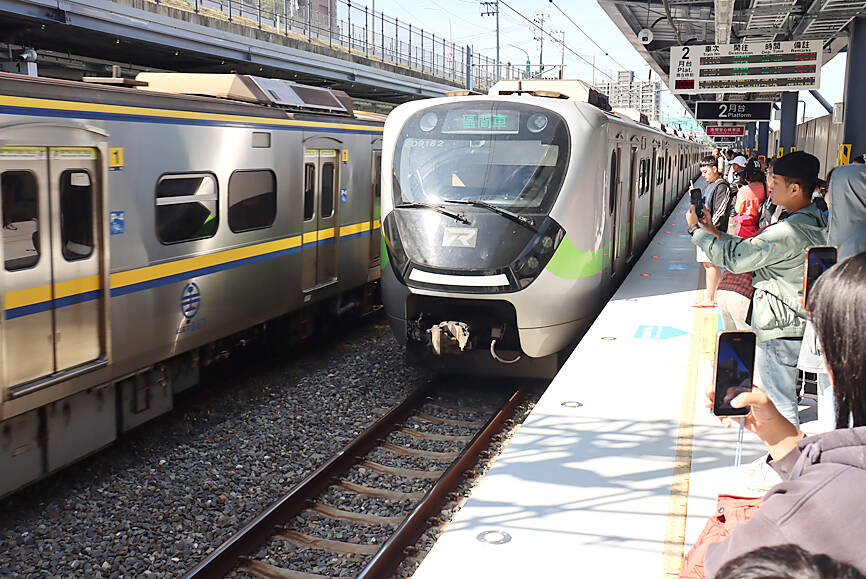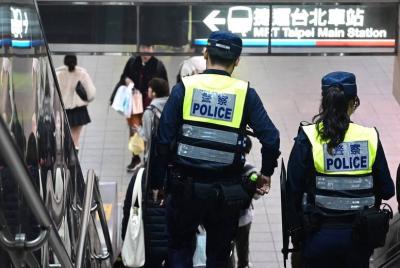Taiwan Railway Corp is likely to post losses of NT$12 billion (US$367.31 million) this year, its first year as a state-owned corporation after having been a government agency for many decades.
The projected losses would exceed the company’s estimation of losses of more than NT$7.4 billion and the losses of NT$11.4 billion the former Taiwan Railways Administration (TRA) posted last year.
The company’s core railway business is likely lose NT$13 billion, up NT$379 million year-on-year, Taiwan Railway data showed.

Photo: Wong Yu-huang, Taipei Times
It would also be saddled with an additional NT$2 billion in expenses that Taiwan Railway chairman Du Wei (杜微) said was needed to convert the former government agency into a commercial company.
The expenses included increasing the employee welfare fund to NT$2.3 billion from NT$1.2 billion as was originally budgeted, spending NT$600 million more than last year on railcar depreciation and paying NT$200 million in fees related to asset transfers, Du said.
The roughly NT$15 billion in losses were expected to be somewhat offset by an expected NT$3.39 billion from side businesses, such as sales of boxed lunches, land development and leasing, he said.
The company generally struggled on the revenue side in its first year, Du said.
Property transfers reduced Taiwan Railway’s rental income, while an ongoing freeze of fares — which have not changed for nearly 30 years — made it hard to increase core revenue, he said.
However, he remained upbeat about the company’s future, saying that operating income might turn positive by as early as 2026, as long as it overcomes the many challenges faced by the TRA, including NT$170 billion in short-term debt.
Taiwan Railway would likely not run a net profit until its new land development projects start generating income, probably no sooner than 2027, Du said.
Although it operated as a company this year, its on-time performance fell to 93.5 percent, well short of its 97 percent target and down from 95.98 percent last year and 94.98 percent in 2022.
Du attributed the drop in performance to damage to the rail network caused by natural catastrophes, with earthquakes and aftershocks resulting in more than 900 delays of Taiwan Railway trains.
Heavy rain and typhoons also contributed to the on-time woes, he said.
Du said the firm has a target for 99 percent of its services to be on time by 2033.
The two-decade plan to corporatize the TRA, which was founded in 1948, did not gain traction until 2018 and 2021, when two fatal derailments occurred, highlighting the need for an across-the-board overhaul of the agency to ensure safer and more efficient rail travel.
Taiwan Railway has established a unit dedicated to rail safety and devised a five-year safety-enhancement plan to improve risk assessments and implement performance evaluations, Du said.
It is also reinforcing its own safety management system to bolster the control and prevention of risk hazards, especially in light of crashes that resulted from poor driving and dispatching, Du said.
Following those incidents, personnel underwent intensive training on cars newly equipped with automatic train protection devices at training centers across Taiwan, he added.

Beijing could eventually see a full amphibious invasion of Taiwan as the only "prudent" way to bring about unification, the US Department of Defense said in a newly released annual report to Congress. The Pentagon's "Annual Report to Congress: Military and Security Developments Involving the People's Republic of China 2025," was in many ways similar to last year’s report but reorganized the analysis of the options China has to take over Taiwan. Generally, according to the report, Chinese leaders view the People's Liberation Army's (PLA) capabilities for a Taiwan campaign as improving, but they remain uncertain about its readiness to successfully seize

Taiwan is getting a day off on Christmas for the first time in 25 years. The change comes after opposition parties passed a law earlier this year to add or restore five public holidays, including Constitution Day, which falls on today, Dec. 25. The day marks the 1947 adoption of the constitution of the Republic of China, as the government in Taipei is formally known. Back then the Chinese Nationalist Party (KMT) governed China from Nanjing. When the KMT, now an opposition party in Taiwan, passed the legislation on holidays, it said that they would help “commemorate the history of national development.” That

Taiwan has overtaken South Korea this year in per capita income for the first time in 23 years, IMF data showed. Per capita income is a nation’s GDP divided by the total population, used to compare average wealth levels across countries. Taiwan also beat Japan this year on per capita income, after surpassing it for the first time last year, US magazine Newsweek reported yesterday. Across Asia, Taiwan ranked fourth for per capita income at US$37,827 this year due to sustained economic growth, the report said. In the top three spots were Singapore, Macau and Hong Kong, it said. South

Police today said they are stepping up patrols throughout the Taipei MRT system, after a social media user threatened to detonate a bomb at an unspecified station this afternoon. Although they strongly believe the threat to be unsubstantiated, Taipei Metro police and the Railway Police Bureau still said that security and patrols would be heightened through the system. Many copycat messages have been posted since Friday’s stabbing attacks at Taipei Main Station and near Zhongshan MRT Station that left three dead and 11 injured, police said. Last night, a Threads user in a post said they would detonate a bomb on the Taipei